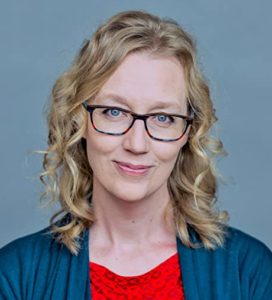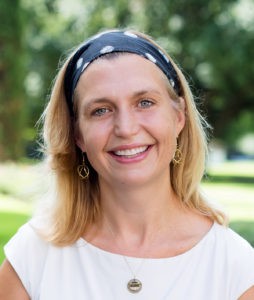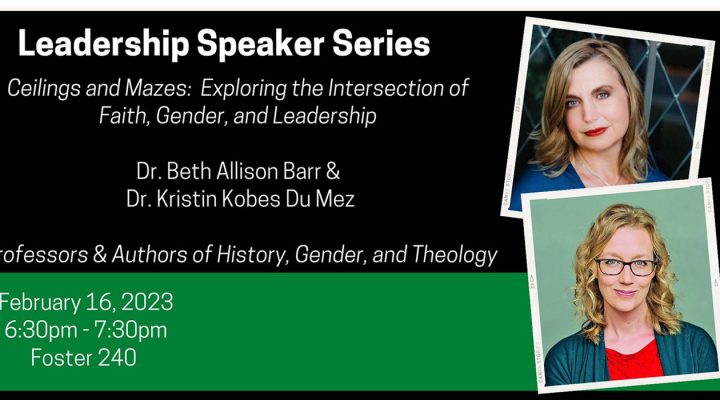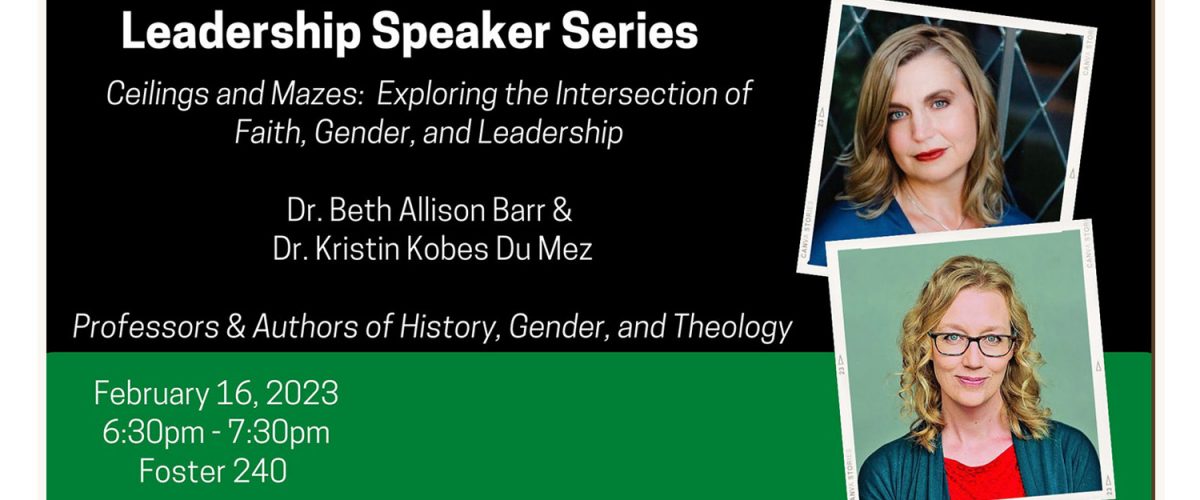Historians, academics and authors Beth Allison Barr and Kristin Kobes Du Mez discussed the challenges and rewards of being Christian women in a male-oriented world and profession during a wide-ranging discussion at Baylor University Feb. 16.
Barr, the James Vardaman professor of history at Baylor, and Du Mez, professor of history at Calvin University in Grand Rapids, Mich., addressed “Ceilings and Mazes: Exploring the Intersection of Faith, Gender and Leadership.”
Setting their comments into context, they addressed the history of patriarchy and its impact on women.
Barr, author of The Making of Biblical Womanhood, said people often think of patriarchy as “the subjugation of women” when it exists in any culture that is male-dominated and male-centered. That has been a continuous theme throughout history, and it has been everywhere, but it has not been the same everywhere, she said.
“The questions historians have is: Why do we find these systems so persistent? And why do we find them repeated? And how are they different?” she said. “When we think about patriarchy within our modern society as well as within our churches, what we find is the reasons that persist are not the same as in the past. Which tells us patriarchy is not something that has to be here. It is something we can challenge and change.”
Du Mez, author of Jesus and John Wayne, said at any given historical moment, people in that moment tend to be oblivious to changes that came before them.
“ … as a historian, we have this broader vantage point that we can see what appeared to be timeless, eternal and God-ordained in fact changed really dramatically over time.”
“So, whatever is right in front of them seems to them timeless, eternal, God-ordained,” she said. “But then as a historian, we have this broader vantage point that we can see what appeared to be timeless, eternal and God-ordained in fact changed really dramatically over time. And then across cultures and across different racial groups, ethnicities, social classes, there is so much diversity.”
Changing the definitions
Du Mez, who teaches American history, said a large transformation and social change occurred in the United States from the colonial era into the 19th century because of a change in the nature of labor. Prior to industrialization, men and women both worked on farms and tended the homestead, and women were considered as productive and essential as men.

Kristen Kobes Du Mez
“But by the 19th century, labor itself had been redefined as something you go out of the home to do, get a paycheck and then bring it back. And so men were defined as the breadwinners, and women got redefined,” she said. “What they were doing — even though it was largely still the same and very productive — it got redefined as leisure.”
That transition applied mostly to white middle-class women, she added.
“For women who didn’t have access to the economic means to have that life, it was devastating, because they weren’t ‘real women’ and didn’t have the protections of womanhood,” she said. “You can see how that was defined as God-ordained femininity, as true womanhood, as biblical womanhood. But it was only accessible to a small number of people, and it was very culturally specific.”
Barr, an expert on medieval history, said one of her classes recently studied the ordination of women throughout the medieval world. Rather than women not being involved in ministerial work in the past, the definition of ordination changed, she said.
“So, when people say, ‘Show me a time in the past when women have been ordained?’ what they are working from is our modern definition, and what I know is that’s not always how ordination has been defined,” she said. “It’s not that women haven’t always been in the workplace, … it’s that we have redefined what counts as work. And women’s work is always counted as being less important and therefore earning less than men.”
Inequality in the workplace
Barr and Du Mez shared personal experiences that highlight unequal standards for women and men in the workplace.
“Women in academia often can be criticized for behaviors that actually are praised for men.”
“Women in academia often can be criticized for behaviors that actually are praised for men,” Barr said. “For example, if a male colleague is very assertive and speaks his mind and takes a stand for something in a meeting, that could be like, ‘Oh, he’s a leader.’ But if a woman does that, then she is often seen as a troublemaker or someone who is speaking out of turn.”
That perception creates obstacles for a woman’s progress through the academic tenure track.
“This is something that we call ‘the leaky pipeline’ in academia,” she said. “There’s a lot of women who come in, but they don’t make it up through the top.”
Du Mez teaches students from conservative backgrounds who aren’t used to seeing female authority figures in higher education, she said, noting she finds it helpful to “read the room” to understand the expectations.
“Sometimes, I like to lean into whatever may be too feminine or too harsh or too abrupt if I feel I’m in a position of power, and I can do this and then I can disrupt those norms for others,” she said. “There are other times that I choose not to disrupt that space and give my students, whoever they are, as much information as I can to help them understand the spaces that they move in historically, culturally in terms of power dynamics. Not so they can conform, but so they have agency and can decide how they want to present in each different scenario.”
Barr and Du Mez spoke on the importance of having advocates in their corner at crucial points in their careers.
“What I’ve had at Calvin, all along the way, are people in positions of power who have used those positions to smooth the way for me, starting with my chair coming in,” Du Mez said.
A student evaluation after her first semester at the university claimed she was a “feminist,” she recalled. She thought it would get her in trouble with her department chair. Instead, he said: “Oh yeah, you know what Kristin? If you weren’t getting those complaints, I would think you weren’t doing your job. This is what we brought you here to do.”
Deans and provosts also placed her on key committees, “and I knew they were doing that because they saw potential,” she said. “And, yes, it was work and lots of hours, but I also saw they were positioning me in ways that would advance my career.”
“The reason I am where I am today is mostly because male colleagues have lifted me up and put me strategically into positions where I could have some leadership.”
Barr said male colleagues at Baylor have looked out for her. “The reason I am where I am today is mostly because male colleagues have lifted me up and put me strategically into positions where I could have some leadership,” she explained.
Barr and Du Mez talked of the challenges of starting families and having children while working in academia, whether facing the attitudes of some colleagues and students or the lack of maternity and parental leave policies.
“I was in the classroom three weeks after having a C-section with my son, and I was back in the classroom four weeks after having a C-section with my daughter when she ended up in the NICU,” Barr said. “And at the time, those were things that I didn’t realize I should have pushed and made space for me not to have to do.”
One student complained she shouldn’t have children while teaching his class, she reported. “I also had one of my colleagues tell me it was great I had my second child, because hopefully I was done with the baby thing now. So, you know there’s still — even in a space I think is very welcoming of women and trying to push women forward — there are still these ideas that make it difficult for women to navigate.”
Calvin also did not have a functioning maternity leave policy when she was expecting her first child, Du Mez said, noting male colleagues went with her to advocate for maternity leave. “And then we kept working after I got mine approved to change it on the books and spent more than a year doing that,” she said.
Challenging conservative views
Both authors wrote best-selling books that challenged conservative beliefs and perspectives on history, and Du Mez said she enjoys those challenges.
“If (people are) challenging my views on history, I love that, and I say, ‘OK, let’s look at the evidence,’ and they disappear like that’s it,” she said. “But that’s what we are in this game for. This is what we do day-in and day-out.”
But she does not like being attacked personally or having her work or her beliefs mischaracterized, which she said happens frequently.

Beth Allison Barr
Barr said she does not “enjoy” the drama as much as Du Mez does.
“Sometimes, I do opt not to talk into some of the … controversies, and that’s not a choice that everyone would make, but it’s one that sometimes I make,” she said. “If it’s a conversation that I’ve had multiple times, it’s not worth it for me to continue on, especially with the emotional labor I might put into it.”
She also tends to think about her responses for a long time, she said. Following publication of one of the most well-read critical reviews of The Making of Biblical Womanhood, she took two-and-a-half months to reflect and then came out with a three-part response.
“What’s really interesting is that I don’t think (the critic) ever mentioned me negatively again. He just kind of ignores me, which is kind of nice,” she said.
Barr has learned to choose her battles based on how much it matters, and what really matters to her is when somebody doubts her belief in the Bible, she noted.
“I will speak out … if they impugn my faith,” she said. “I will speak out against that, because it’s very important for me to do this not just as a medieval historian, but as a Christian woman who wants people to know that you can believe fully in the Christian faith and not support the subjugation of women. I will speak out in those spaces to make sure people know who I actually am.”
Backlash and support
Challenges raised about her book have strengthened her faith, Barr said.
“People ask me all the time, ‘Why do you still believe?’ I can honestly tell them because it’s not God who messed this up; it’s people who messed it up. And through God, we can help fix it.”
“I can say beyond a doubt that my faith has strengthened throughout this whole process,” she reported. “People ask me all the time, ‘Why do you still believe?’ I can honestly tell them because it’s not God who messed this up; it’s people who messed it up. And through God, we can help fix it.”
Barr and Du Mez frequently receive letters all from ordinary Christians who describe how they’ve been encouraged or how something they read changed them, Barr said.
“It’s just so energizing to hear Christians around the world admitting they were wrong, admitting even though they’ve been damaged by the church in the past, they think they can move forward, and somehow, we have helped them in that way that they have found healing through reading our books. That’s just so wonderful to me,” she said.
While followers see the attacks they receive on Twitter, they don’t see all the letters they receive sharing testimonies and offering support, Du Mez added.
“We get that every single day, and so we’re really strengthened and sustained by that, and it is such a source of joy and of really feeling part of the larger body of Christ,” she said.
Asked about their response to backlash from women who protect patriarchy and subjugation, Barr said she understands their position.
“I don’t blame people for believing in the subjugation of women, because it’s what’s been taught in Christianity, especially in white southern Christianity, for a long time.”
“I don’t blame people for believing in the subjugation of women, because it’s what’s been taught in Christianity, especially in white southern Christianity, for a long time,” she said. “Some people just don’t know any different, and they’ve also been taught this is what it means to be a godly woman, and it’s tied up with their faith, and I totally understand it.”
Rather than being angry or trying to dissuade, she wants people to listen and understand that women who don’t believe as they do can be just as faithful Christians as well, she added.
“That’s what I really would like to get across,” she said. “But I also think with being a white woman, it’s important to realize non-white women have different experiences from white women, and there is a privilege associated with the sort of southern Christian ideal of a mom who is able to take care of kids and maybe not work as much outside the home. That is a privileged position. It is not a position that’s rooted in faith, it’s rooted in culture.”
Jeff Hampton is a freelance writer based in the Dallas area. His career has spanned newspapers, magazines and corporate communications. He blogs weekly for Wilshire Baptist Church and is the author of three novels and a collection of short stories.
Related articles:
For Godself’s sake, stop picking on the small church where Beth Allison Barr’s husband is the pastor
Christian masculinity, culture and racism: An interview with Kristin Du Mez
For every critic of Jesus and John Wayne, there are many more positive responses, Du Mez says


